
Why Bitcoin Is Not a Company, a Stock, or a Tech Startup
If you’ve ever heard someone say, “I want to invest in Bitcoin like I did in Apple,” or “Should I buy Bitcoin or Ethereum stock?”, you’ve witnessed one of the most common and damaging misconceptions about Bitcoin.
Bitcoin is not a company.
Bitcoin is not a stock.
Bitcoin is not a tech startup.
And misunderstanding this simple truth leads to confusion, scams, bad investments, and missed opportunities.
Let’s break it down once and for all.
1. Bitcoin Has No CEO, No Board, and No Marketing Department
Apple has Tim Cook. Meta has Mark Zuckerberg. Ethereum has Vitalik.
Bitcoin has... no one.
There is no central leadership, no official roadmap, and no headquarters. Bitcoin is decentralized by design.
That means no one can shut it down, change its rules without consensus, or direct its evolution unilaterally.
It’s not a company building a product for profit. It’s a protocol—like TCP/IP or email.
If you think Bitcoin needs “better leadership” or “faster innovation,” you’re missing the point: immutability and neutrality are the features. Not bugs.
2. Bitcoin Doesn’t Promise Returns—It Offers Freedom
Stocks promise future earnings. Startups raise funding with growth projections. Tokens pump on hype cycles.
Bitcoin does none of that.
It doesn’t promise profits.
It doesn’t have quarterly earnings.
It doesn’t try to disrupt a niche.
Bitcoin is money.
Not a bet. Not a product. Not an app.
It’s a tool that gives people economic sovereignty. You don’t buy Bitcoin hoping it performs better than Google. You buy Bitcoin because you want to exit the system entirely.
3. You Don’t “Invest” in Bitcoin. You Adopt It.
When you buy stock, you’re investing in someone else’s execution.
When you buy Bitcoin, you’re exiting the fiat system.
That’s not an investment. That’s a monetary migration.
Bitcoin adoption isn’t about yield. It’s about opting into a new set of rules—ones where no one can inflate away your savings, freeze your funds, or change the rules mid-game.
It’s not venture capital. It’s self-sovereignty.
4. Bitcoin Has No Competitors—Because It’s Not Competing
Bitcoin isn’t racing against tech startups. It’s not trying to win market share from Venmo or PayPal.
It’s building something entirely different:
A trustless, permissionless, censorship-resistant base layer for global value.
That’s not something you iterate on every quarter. It’s something you solidify with discipline and long-term thinking.
Other coins may be faster, flashier, or more flexible—but they trade decentralization for features. And in money, trust minimization is non-negotiable.
5. Treating Bitcoin Like a Tech Play Misses the Mission
If you treat Bitcoin like a stock, you’ll panic when price dips. You’ll chase trends. You’ll expect roadmaps and feature releases.
But Bitcoin isn’t here to 10x your portfolio. It’s here to end the monopoly on money.
Bitcoin is a once-in-a-species invention—digital scarcity with no central control. It’s protocol, not product.
That requires a shift in mindset from speculation → adoption.
Conclusion: Bitcoin Is in a Category of Its Own
It’s not equity.
It’s not debt.
It’s not startup equity with a token ticker.
It’s something entirely new: a decentralized, incorruptible monetary network.
You don’t invest in it like a stock. You opt into it like a life raft.
And once you stop thinking about Bitcoin through the lens of Wall Street or Silicon Valley, you’ll finally see what it really is:
The base layer of a new financial reality.



